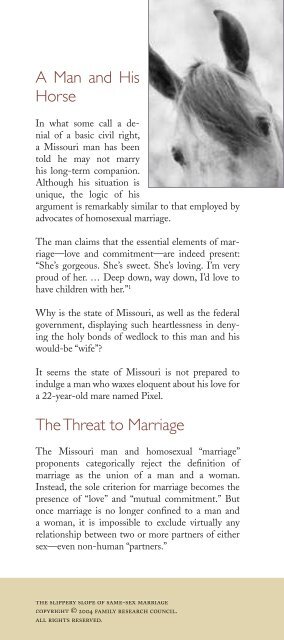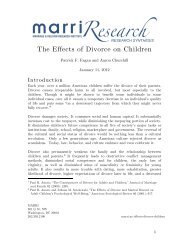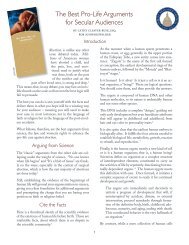The Slippery Slope of Same-Sex Marriage - Family Research Council
The Slippery Slope of Same-Sex Marriage - Family Research Council
The Slippery Slope of Same-Sex Marriage - Family Research Council
You also want an ePaper? Increase the reach of your titles
YUMPU automatically turns print PDFs into web optimized ePapers that Google loves.
A Man and His<br />
Horse<br />
In what some call a denial<br />
<strong>of</strong> a basic civil right,<br />
a Missouri man has been<br />
told he may not marry<br />
his long-term companion.<br />
Although his situation is<br />
unique, the logic <strong>of</strong> his<br />
argument is remarkably similar to that employed by<br />
advocates <strong>of</strong> homosexual marriage.<br />
<strong>The</strong> man claims that the essential elements <strong>of</strong> marriage—love<br />
and commitment—are indeed present:<br />
“She’s gorgeous. She’s sweet. She’s loving. I’m very<br />
proud <strong>of</strong> her. … Deep down, way down, I’d love to<br />
have children with her.” 1<br />
Why is the state <strong>of</strong> Missouri, as well as the federal<br />
government, displaying such heartlessness in denying<br />
the holy bonds <strong>of</strong> wedlock to this man and his<br />
would-be “wife”?<br />
It seems the state <strong>of</strong> Missouri is not prepared to<br />
indulge a man who waxes eloquent about his love for<br />
a 22-year-old mare named Pixel.<br />
<strong>The</strong> Threat to <strong>Marriage</strong><br />
<strong>The</strong> Missouri man and homosexual “marriage”<br />
proponents categorically reject the defi nition <strong>of</strong><br />
marriage as the union <strong>of</strong> a man and a woman.<br />
Instead, the sole criterion for marriage becomes the<br />
presence <strong>of</strong> “love” and “mutual commitment.” But<br />
once marriage is no longer confi ned to a man and<br />
a woman, it is impossible to exclude virtually any<br />
relationship between two or more partners <strong>of</strong> either<br />
sex—even non-human “partners.”<br />
the slippery slope <strong>of</strong> same-sex marriage<br />
copyright © 2004 family research council.<br />
all rights reserved.<br />
To those who object to comparing gay marriage<br />
to widely-rejected sexual preferences, it should be<br />
pointed out that until very recent times the very<br />
suggestion that two men or two women could<br />
“marry” was itself greeted with scorn.<br />
Of course, media stories on same-sex marriage<br />
rarely address the fact that redefi ning marriage<br />
logically leads to the Missouri man and his mare.<br />
Instead, media reports typically focus instead on<br />
homosexual couples who resemble the stereotypical<br />
ideal <strong>of</strong> a married couple. Ignored in such reports is<br />
social science research indicating that such idealized<br />
“families” are utterly atypical among homosexuals.<br />
In this pamphlet we will show the following:<br />
• Gay marriage threatens the institutions <strong>of</strong> marriage<br />
and the family.<br />
• <strong>Same</strong>-sex relationships are not the equivalent <strong>of</strong><br />
traditional marriage<br />
• Gay marriage is not a civil rights issue<br />
• Americans overwhelmingly reject gay marriage<br />
• Gay marriage is not a moral alternative to traditional<br />
marriage.<br />
• Homosexuality is rightly viewed as unnatural.<br />
<strong>The</strong> “Polyamory” Movement<br />
“Sean has a wife. He also has a girlfriend.<br />
His girlfriend has another boyfriend. That<br />
boyfriend is dating Sean’s wife.”<br />
description <strong>of</strong> “polyamory” relationship 1<br />
<strong>The</strong> movement to redefi ne marriage has found full<br />
expression in what is variously called “polyfi delity” or<br />
“polyamory,” which seeks to replace traditional marriage<br />
with a bewildering array <strong>of</strong> sexual combinations<br />
between various groups <strong>of</strong> individuals.<br />
“Polyamory” is derived from Greek and Latin roots,<br />
and is loosely translated “many loves.” Polyamorists<br />
reject the “myth” <strong>of</strong> monogamy and claim to<br />
practice “harmonious love and intimacy between




